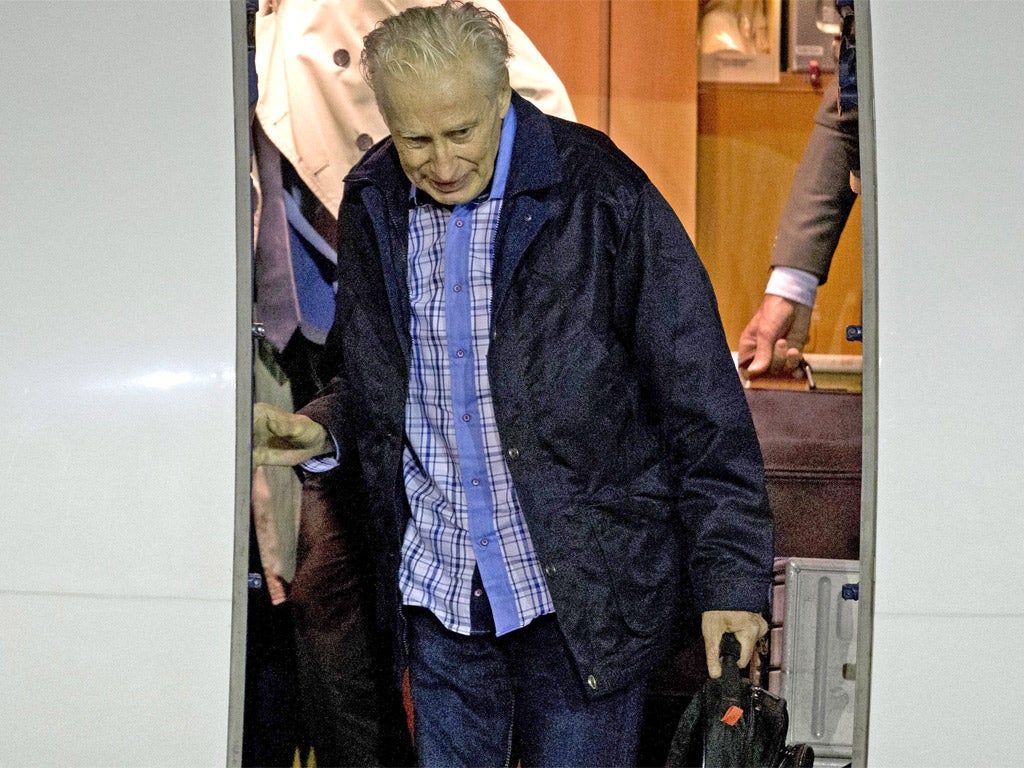The great escape: How a French hostage fled Islamists kidnappers in Nigeria
Francis Collomp, 63, duped his captors into thinking he was feeble and old

Your support helps us to tell the story
From reproductive rights to climate change to Big Tech, The Independent is on the ground when the story is developing. Whether it's investigating the financials of Elon Musk's pro-Trump PAC or producing our latest documentary, 'The A Word', which shines a light on the American women fighting for reproductive rights, we know how important it is to parse out the facts from the messaging.
At such a critical moment in US history, we need reporters on the ground. Your donation allows us to keep sending journalists to speak to both sides of the story.
The Independent is trusted by Americans across the entire political spectrum. And unlike many other quality news outlets, we choose not to lock Americans out of our reporting and analysis with paywalls. We believe quality journalism should be available to everyone, paid for by those who can afford it.
Your support makes all the difference.It was “like something from an adventure book”, the French President, François Hollande, said. Almost a year after he was captured, fresh details have emerged of the extraordinary escape of a French hostage held in northern Nigeria by Islamist militants.
Since his return to France on Monday, Francis Collomp, 63, has rejected initial French government reports that he fled while his captors were being attacked by the Nigerian army.
He has yet to speak publicly but has given an account of his adventures to his family and French intelligence agents, which has been passed on to the media. According to these accounts, Mr Collomp’s escape – alone on foot for three miles and then by motorcycle taxi – was the result of 11 months of planning and self-training. He also duped his kidnappers into believing that he was a feeble, old man with an ailing heart.
Mr Collomp, a wind turbine engineer, told relatives he kept himself fit by pacing up to nine miles each day around his cell. He listened to local radio to improve his knowledge of Haoussa, his captors’ language. He studied their movements and patterns of behaviour.
To maintain his mental agility, according to an account given by his brother, Denis, to news agency, Agence France-Presse, he filled notebooks with sketches and plans for wind generators. He resisted attempts to convert him to Islam and persuaded his captors he was physically and mentally enfeebled by a heart operation several years ago.
On Saturday morning, he told his brother, he had found himself alone in a washroom with the youngest of his abductors. The other kidnappers were in another part of the building, washing in preparation for their daily prayers.
Mr Collomp sneaked out of the room while the young man was distracted, locked his jailers inside the house and fled on foot. According to the account given to his brother and French intelligence, he then walked from the small town of Zaria in northern Nigeria. Eventually, a motorcycle taxi came along and he flagged it down.
He asked the taxi driver to take him to the nearest police station and was taken to the larger town of Kaduna, where he surrendered himself to the astonished officers on duty.
One French newspaper described Mr Collomp’s escape as “worthy of a Hollywood production”.
Is the story too good to be true? French officials have rejected suggestions Mr Collomp’s account is a cover for an undercover deal with the kidnappers. There have been reports – officially denied – that a ransom was paid to free four French hostages held by Islamists in Mali last month.
French officials insist no negotiations took place with Mr Collomp’s kidnappers. They say no money was handed over and that no Islamist prisoners have been released in exchange for the French engineer by the authorities in Lagos.
Mr Collomp was seized from his home in Rimi, near the Niger-Nigerian border last December by a shadowy group called Ansaru. This organisation is believed to be linked to Boko Haram, which has carried out a series of attacks in Nigeria and neighbouring states.
Mr Collomp and Nigerian security officials have denied reports that military operations against Islamist rebels groups in northern Nigeria led directly, or indirectly, to his escape.
Join our commenting forum
Join thought-provoking conversations, follow other Independent readers and see their replies
Comments